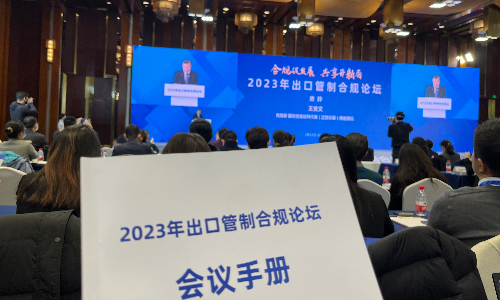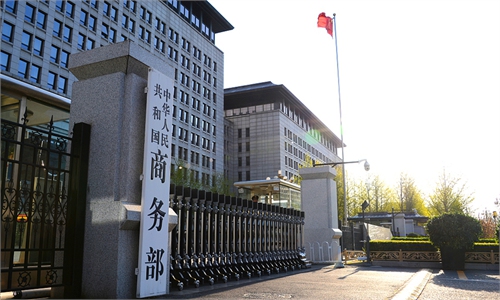
Photo: Chu Daye/GT
Senior Chinese officials condemned the abuse of export control measures by some countries at a forum in Beijing on Thursday, vowing to safeguard national security while calling for the implementation of fair, reasonable and non-discriminatory export control measures.
"In recent years, some countries have generalized the idea of export control, and want only added large number of companies onto their respective entity lists, seriously violated international trade rules and disrupted global industry and supply chain," Wang Shouwen, vice minister of Minister of Commerce (MOFCOM), said during a forum on export control compliance.
He added that China opposes such abuses and supports a fair, reasonable, and non-discriminatory approach to export controls, noting that China supports a fair, reasonable and non-discriminatory approach to exports control.
The forum, attended by over 600 industry representatives, was hosted by the China Chamber of Commerce for Import and Export of Machinery and Electronic Products (CCCME).
While countries around the world implement export control measures for national security and nuclear non-proliferation reasons, Wang noted that some countries have been recklessly expanding the scope of these measures, which can have strong geopolitical implications.
For instance, Since the Trump administration, the US has ratcheted up its crackdown on Chinese companies via an increasingly expanding entity list. As of December 12, 2022, number of Chinese entities has rising to a staggering 2,029, covering a wide range of sectors such as telecommunication, finance, transportation and shipping. Over 1,000 entities are Chinese companies while the others are institutions.
Most recently, the US The Commerce Department added six Chinese entities amid the hype of the balloon case. China expressed its strong opposition.
With regard to the US' wanton act, China has reacted by opposing it under the WTO framework. In December, China filed a case against the US over its ban of semiconductor exports at the WTO.
To combat such practices, China has been building up its legal framework on export control, including the introduction of the Export Control Law in 2020 and the development of draft regulations on dual-use item export control,, experts at the forum said.
Additionally, Weng Jieming, vice chairman of the State-owned Assets Supervision and Administration Commission of the State Council (SASAC), noted that SASAC is guiding central state-owned enterprises to proactively cope with unreasonable sanctions in the form of export control abuse.
Weng urged combined force from government, enterprise and academic circles to resist together unreasonable sanctions in the form of export control abuse to safeguard the security of industrial and supply chain of China as well as the world.
A number of countries, many from the G7 and notably the US, have put foreign policy as a consideration when it comes to using their export control measures.
Shi Xiaoli, professor from the China University of Political Science and Law, told the Global Times on Thursday that in face of the abuse by some countries over the export control measures, China is entitled to file lawsuit against the US at the WTO and demand the US to rectify its wrongdoings.
In regard to China's case against the US over semiconductor exports, Shi said she believes China will and should carry the lawsuit to the end, unless the US rectifies its abuse of export control measures under the security exception under the WTO. Recently, the panel at the WTO has ruled US abuse of national security exception under GATT on two separate cases.
China is entitled to take retaliatory measures when necessary to safeguard its national interests, Shi said.
Officials noted that work around China's export control will be ensuring both development and security and noted that China is aligned with international practice.
Wang stated that MOFCOM issues export permits for dual-use items to over 1,000 Chinese companies each year, with a combined value of $20 billion, to support the high-quality growth of foreign trade.



